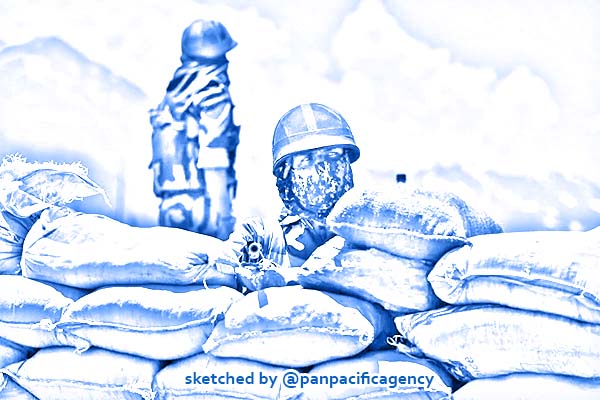India insists that China withdraw troops from friction points

Indian soldiers guard a highway leading to the Ladakh region. Photo: DPA. Sketched by the Pan Pacific Agency.
NEW DELHI, Oct 13, 2020, The Asian Age. India and China on Monday held the seventh round of their corps commander-level talks to ease tensions in eastern Ladakh where both armies are involved in a tense five-month-long military standoff. The meeting started at around 12 noon at Chushul, on the Indian side of the Line of Actual Control and went on till late in the night for more than 10 hours at least, The Asian Age reported.
India has again insisted that China withdraw its troops from all friction points in eastern Ladakh and restore the status quo ante of April 2020 in Pangong Tso and Gogra Post-Hot Springs. The Chinese Army has also been preventing Indian patrols in the Depsang sector. India has made it clear that since it was China which had first transgressed, the People’s Liberation Army has to make the first move towards disengagement.
There was no official word yet on the corps commanders’ meeting. An official statement may be released on Tuesday or Wednesday. The Indian and Chinese armies had issued a joint press release after the sixth round of the corps commanders’ meeting. This was the first corps commanders’ meeting after China said that it has “not recognised” the Union territory of Ladakh.
The meetings with the Chinese military tend to be lengthy as discussions usually need to be translated.
This was the last meeting under Lt. Gen. Harinder Singh as commander of 14 Corps. He is all set to take charge as the commandant of the Indian Military Academy, Dehra Dun, later this month after completing his one-year tenure.
Lt. Gen. P.G.K. Menon, who will be the new 14 Corps chief, also took part in Monday’s meeting. The representative from the external affairs ministry, joint secretary (East Asia) Naveen Srivastava, too attended the corps commanders’ meeting for the second time. There were reports that some Chinese foreign ministry officials also attended the meeting for the first time.
In the last corps commanders’ meeting, both sides had agreed to stop sending more troops to the front line, refrain from unilaterally changing the situation on the ground, and avoid taking any action that may further complicate the situation.
Since the sixth corps commanders’ meeting, some type of uneasy peace has been maintained at the LAC in Ladakh, which had seen a number of firing incidents for the first time in over four decades. However, tension remains high in the area, with both sides having deployed troops, tanks, artillery, missiles and fighter aircraft at advanced bases. The Army and the Indian Air Force are still on high alert.
Both sides are prepared to keep their armies at these high altitude bases in the mountains during winter, when temperatures dip way below zero degrees and bone-chilling winds make survival extremely difficult.